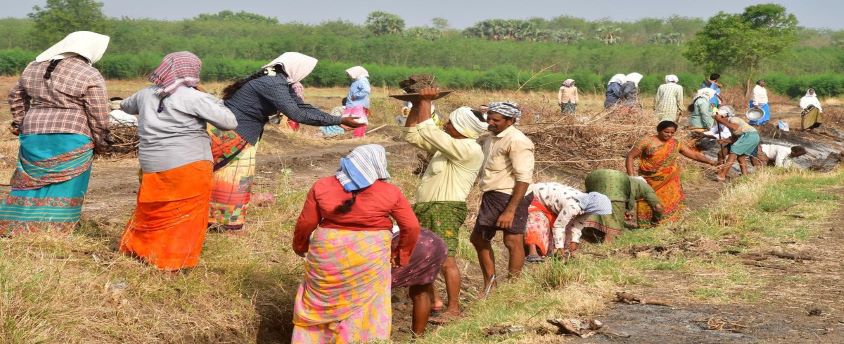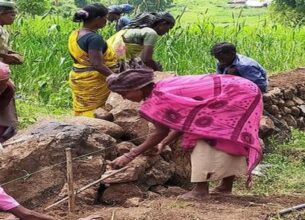MGNREGS wage rates revised by up to 10% for 2023-24 fiscal year
27, Mar 2023

Prelims level : Schemes
Mains level : GS-III Indian Economy and issues relating to planning, mobilization of resources, growth, development and employment
Why in News?
- The Centre has notified a hike in wage rates under the rural job guarantee programme for the 2023-24 financial year with Haryana having the highest daily wage at ₹357 per day and Madhya Pradesh and Chhattisgarh the lowest at ₹
About the News:
- The notification was issued under Section 6 (1) of the Mahatma Gandhi National Rural Employment Guarantee Act (MGNREGA), 2005, that says the Centre may, by notification, specify the wage rate for its beneficiaries.
- The wage hikes, which range from ₹7 to ₹26, will come into effect from April 1.
- Compared to last year’s rates, Rajasthan registered the highest percentage increase in wages. The revised wage for Rajasthan is ₹255 per day, up from ₹231 in 2022-23.
- Bihar and Jharkhand have registered a percentage increase of around eight from last year. Last year, the daily wage for a MNREGA worker in these two states was ₹ It has now been revised to ₹228.
- For Chhattisgarh and Madhya Pradesh, which have the lowest daily wages at ₹221, the percentage increase from last year was recorded at 17.
- In 2022-23, the two States had a daily wage of ₹
- The increases in the wages for states range between two and 10%. Karnataka, Goa, Meghalaya and Manipur are among the States to register the lowest percentage increase.
About MGNREGA:
- The scheme was introduced in 2005 as a social measure that guarantees “the right to work”.
- The key tenet of this social measure and labour law is that the local government will have to legally provide at least 100 days of wage employment in rural India to enhance their quality of life.
Key objectives:
- Generation of paid rural employment of not less than 100 days for each worker who volunteers for unskilled labour.
- Proactively ensuring social inclusion by strengthening the livelihood base of rural poor.
- Creation of durable assets in rural areas such as wells, ponds, roads and canals.
- Reduce urban migration from rural areas.
- Create rural infrastructure by using untapped rural labour.
What are the eligibility criteria for receiving the benefits under MGNREGA scheme?
- Must be Citizen of India to seek MGNREGA benefits.
- Job seeker has completed 18 years of age at the time of application.
- The applicant must be part of a local household (i.e. application must be made with local Gram Panchayat).
- Applicants must volunteer for unskilled labour.
Implementation of the scheme:
- Within 15 days of submitting the application or from the day work is demanded, wage employment will be provided to the applicant.
- Right to get unemployment allowance in case employment is not provided within fifteen days of submitting the application or from the date when work is sought.
- Social Audit of MGNREGA works is mandatory, which lends to accountability and transparency.
- The Gram Sabha is the principal forum for wage seekers to raise their voices and make demands.
- It is the Gram Sabha and the Gram Panchayat which approves the shelf of works under MGNREGA and fix their priority.
What is Democratic Decentralisation?
- Democratic decentralization is the process of devolving the functions and resources of the state from the Centre to the elected representatives at the lower levels so as to facilitate greater direct participation of citizens in governance.
- Devolution, envisioned by the Indian Constitution, is not mere delegation.
- It implies that precisely defined governance functions are formally assigned by law to local governments, backed by adequate transfer of a basket of financial grants and tax handles, and they are given staff so that they have the necessary wherewithal to carry out their responsibilities.
Related Constitutional Provisions:
- Local government, including panchayats, is a state subject in the Constitution, and consequently, the devolution of power and authority to panchayats has been left to the discretion of states.
- The Constitution mandates that panchayats and municipalities shall be elected every five years and enjoins States to devolve functions and responsibilities to them through law.
- The 73rd and 74th Amendments, by constitutionally establishing Panchayati Raj Institutions (PRIs) in India, mandated the establishment of panchayats and municipalities as elected local governments.
- These amendments added two new parts to the Constitution, namely, Part IX titled “The Panchayats” (added by 73rd Amendment) and Part IXA titled “The Municipalities” (added by 74th Amendment).
- The 11th Schedule contains the powers, authority and responsibilities of Panchayats.
- The 12th Schedule contains the powers, authority and responsibilities of Municipalities.
- Article 40: Organization of a village panchayat.







